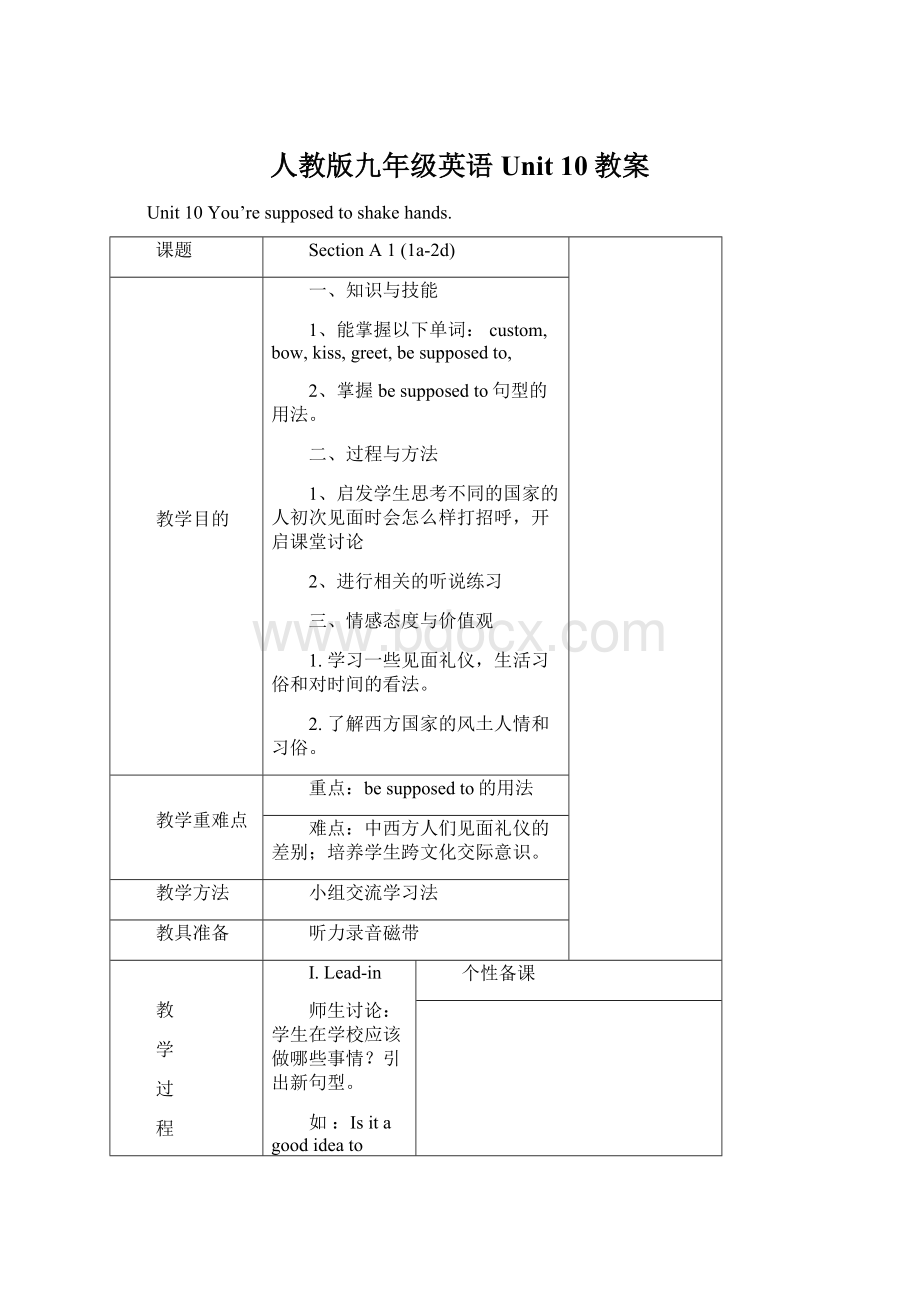人教版九年级英语Unit 10教案Word格式.docx
《人教版九年级英语Unit 10教案Word格式.docx》由会员分享,可在线阅读,更多相关《人教版九年级英语Unit 10教案Word格式.docx(54页珍藏版)》请在冰豆网上搜索。

程
I.Lead-in
师生讨论:
学生在学校应该做哪些事情?
引出新句型。
如:
Isitagoodideatocometoclasslate?
S:
No.
T:
That’sright.It’snotagoodideatocomelate.You’renotsupposedtocometoclasslate.You’resupposedto…
eatinclass,dohomeworkeveryday,raiseyourhandbeforetalking等做更多的练习,引出besupposedto句型
II.Discussion
1.大屏幕展示一张世界地图,师生对话:
DoyouknowwhereBrazil/theUnitedStates/Japan/Mexico/Koreais?
…
Doyouknowwhatpeopledowhentheymeetforthefirsttime?
…
2.利用多媒体播放各国初次见面的礼仪,学习新单词:
custom,bow,kiss,greet,
III.Workon1a-1c
1.1a
多媒体呈现1a图片,让学生根据图画内容,说说图中的握手,接吻,鞠躬是哪个国家的礼仪,然后按要求把书本给出的“国家”和“习俗”连接起来。
老师不要给出答案。
2.Listening1b.
Listentotherecordingandcheckyouranswerstoactivitiesin1a.
3.Pairwork:
A:
WhatarepeopleinKorea/…todowhentheymeetforthefirsttime?
B:
Theyaresupposedtobow.HowaboutintheUnitedStates?
They’resupposedtoshakehands.
4.教师介绍本单元的目标语言:
You’resupposedto….
Ⅳ.Listening
1.Listeningto2aand2b.WhatmistakesdidMariamake?
2.Finish2aand2b.
3.Pairwork
Role-playaconversationbetweenMariaandDan.
Dan:
HowwasthedinneratPaul’shouselastnight?
Maria:
Well,itwasOK,butImadesomemistakes.Iwassupposedtoarriveat7:
00,butI…
V.Roleplay
Workon2dRoleplayaconversationbetweenKatieandJohn.Discussdifferentcustomsindifferentcountries.
Readtheconversationagainandanswerthesequestions:
1.WhatdoesJohnthinkofthewelcomeparty?
Great.
2.What’sthenameoftheJapaneseboydidJohnmeet?
Sato.
3.DidJohnreturnthebowintheend?
Yes,hedid.
4.WhatdidKatiedowhenshefirstmetMarielastyear?
Sheheldoutherhand.
5.WhatareFrenchpeoplesupposedtodowhentheyseeeachother?
Theyaresupposedtokiss.
VI.Consolidation
完成任务:
礼仪大荟萃
让学生展示上课前通过网络或书籍等形式查找到的各国礼仪,并分类记录,制成表格。
VII.Languagepoints
进一步向学生讲解本单元的目标语言:
besupposedto,beexpectedto.
1.Youaresupposedtoshakehands.
besupposedtodo…“应该……被期望做……”,当句子的主语是____时,它可
以用来表示__________________________等,意思是“tobeexpectedtodosth.,ortohavetodosth.”人;
劝告,建议,义务,责任
e.g.You’resupposedtoasktheteacherifyouwanttoleavetheclassroom.
如果你要离开教室,应该先问问老师。
WearenottosupposedtoplayfootballonSunday.
不准我们在星期日踢足球。
2.That’showpeopleinJapanareexpectedtogreeteachother.
greet=towelcomeorsay“hello”动词“问候,打招呼”
e.g.Hegreetedherbysaying“goodmorning”.
他向她打招呼说“早上好”。
Shegreetedmewithafriendlysmile.她向我微笑致意。
VIII.Homework
Writeapassageaboutdifferentcustomsindifferentcountries.
个性备课
课后小记
SectionA2(3a-3c)
1、学习掌握下列词汇:
relaxed,value,capital,noon,mad,effort,dropby,afterall,getmad,makeaneffort
2、复习besupposedto句型。
3、如何正确的阅读课文。
1、复习上节课的知识点和单词,考察学生的课后复习情况
2、引导学生对人际交往中的时间观念进行讨论
1、通过“应该”与“不应该”进一步了解一些国家的礼仪和对时间的看法。
2、了解不同国家的不同的时间观念,加强对中国文化的理解。
1、掌握本部分出现的生词和词组,达到熟练运用的目标。
2、阅读短文,获得相关的信息。
通过阅读练习,来提高阅读能力。
理解并运用所学的词汇及表达方式。
Ⅰ.Warmingup
1.师生问候。
2.让学生展示上节课的演讲稿:
各国礼仪的差异
Ⅱ.Lead-in
1.展示一个哥伦比亚和瑞士风光的照片。
使学生熟悉这两个国家的情况,通过图片欣赏引出本节内容。
2.Lookatthepicturesandsaysomethingaboutthetwocountries.
WhatdoyouknowaboutSwitzerland?
WhatdoyouknowaboutColombia?
Ⅲ.Reading
1.Workon3a:
TellSstoreadthearticleandanswerthequestion:
InwhichcountryisitOKtobe15minuteslatefordinner?
Ssreadthearticlequicklyandtrytofindtheanswertothequestion.
2.方法指导:
首先,对原文材料迅速浏览,掌握全文的主旨大意。
速读全文,抓住中心主旨很有必要,在速读的过程中,应尽可能多地捕获信息材料。
其次,带着问题,再回到原文中去寻找、捕获有关信息。
做好这类题的要领是:
1).明确题意,顺藤摸瓜。
2).按照要求,寻找答案来源。
3).找准关键词,明白其暗示作用。
4)再读课文,看答案是否符合题意。
3.按指导的方法带着问题进行阅读。
4.最后,教师让部分学生说出自己的答案,并校对答案。
Key:
InColombia.
Ⅳ.CarefulReading
1.Answerthequestionsaccordingtothepassagesin3a.
1.IsitOKifpeopleinColombiaarriveabitlateforafriend’sdinner?
2.Whoareprettyrelaxedabouttime,ColombiansorSwisspeople?
3.Colombiansusuallymakeplanstomeetfriends,don’tthey?
4.WhatareyousupposedtodoifyouwanttovisityourfriendsinSwitzerland?
5.WhatdopeopleinSwitzerlandthinkoftime?
Answers:
1.Yes,itis.2.Colombians3.No,theydon’t.
4.Iamsupposedtomakeplans.
5.Theythinkit’sveryimportanttobeontime.
2.Workon3b.Readthepassageagainandfillinthechart.
.Role-play3c
Role-playaconversationbetweenTeresaandMarc.TeresaislateandMarcismad.
注意使用目标语言:
In…,you’resupposedto…
Hi,Marc.Sorry,I’malittlelate.
B:
Teresa,you’re10minuteslate!
It’sjust10minutes!
It’snobigdeal!
Well,inSwitzerland,you’resupposedto…
.Talking
SaysomethingaboutZhang.
DidyouhaveagoodtimeatZhang’sbirthdayparty?
Oh,yes.ButIwasabithurtaboutthewaytheytreatedmypresent.IgaveZhangthelatesttapesfromtheU.K.asabirthdaypresentwhenIgotinsidethedoorandwhatdoyouthinkhappened?
What?
Nothing.Theyonlysaidthankyou,butthenjustputthemawayinacorner.Ireallydidn’tknowwhy.Didn’ttheylikethem?
Oh,That’smisunderstanding.Inthewest,it’sregardedaspolitetoopengiftsassoonastheyaregiventoexpressappreciation.
ButinChina,ifyoudidthat,youmightbethoughtgreedy(贪婪的).SoChinesepeopletendtoopenthegiftsafterthevisitorshaveleft.
.Languagepoints
1.WhereI’mfrom,weareprettyrelaxedabouttime.
WhereI’mfrom是一个由“where”引导的地点状语从句。
e.g.Juststaywhereyouare.就留在你原来的地方。
relaxedadj.放松的,自在的
berelaxedabout…对…感到放松
e.g.Don’t
be
afraid,
just
relaxed
about
the
interview.
不要害怕,轻松面试。
You
need
to
this
examination.
你只要放松地面对考试就可以了。
2.Wevaluethetimewespendwithourfamilyandfriendsinoureverydaylives.
valuev.珍视,重视
e.g.I’vealwaysvaluedmyteachers’advice.
我一直很重视老师们所给的建议。
lifen.生活(可数名词)
e.g.Manypeoplemakedifferentkindsoffriendsintheirsociallives.
许多人在他们的社交生活中结交了各种不同的朋友。
一些常用短语和表达,如live/have/leada…life,常用life的单数形式。
如:
Shejustwantedtoliveaquietlife.
她只想过平静的生活。
3.Weoftenjustdropbyourfriends’homes.
dropby顺便拜访,
e.g.Dropbymyhomethisevening.今晚到我家来谈谈。
4.InSwitzerland,it’sveryimportanttobeontime.
该句中使用了句型“It’s+adj.+todosth.”,意为“做某事是……的”。
it在句中作形式主语,真正的主语是后面的动词不定式短语todosth.。
如:
It’snecessarytoeathealthyfood.
5.We’rethecapitalofclocksandwatches,afterall!
afterall毕竟
e.g.Soyousee,Iwasrightafterall.你看,毕竟还是我对吧。
Youdecidedtocomeafterall.你毕竟还是决定来了。
6.SoImakeanefforttobeontimewhenImeetmyfriends.
makeaneffort做出努力
e.g.Iwillmakeanefforttostopsmoking.我要尽力戒烟。
Youshouldmakeanefforttoimproveyourreadingability.
你应该努力提高你的阅读能力.
7.Also,wenevervisitafriend’shousewithoutcallingfirst.
双重否定句。
never和without都表示否定,合在一起表达肯定意义,“一定会”。
e.g.YouwillhardlyeverbeabletospeakgoodEnglishwithoutpracticing.
你不练习几乎是不可能把英语学好的。
Homework
WriteashortpassageaboutmannersinColombiaandSwitzerlandin80words.
SectionA3(GrammarFocus-4c)
passport,clean…off,chalk,blackboard,northern,coast,season,knock,eastern,takeoff,worth,manner
2、进行一步复习巩固学习SectionA部分所学的生词和词组。
3、掌握besupposedto,beexpectedto,beimportantto的句型。
巩固重点句型,再进行相关的综合习题练习
进一步了解不同国家的风土人情,体会文化礼仪差异,了解中国的基本礼仪。
1、复习巩固SectionA部分所学的生词和词组,达到熟练运用的目标。
2、总结besupposedto,beexpectedto,beimportantto的不同句型。
besupposedto,beexpectedto,beimportantto的不同句型
Ⅰ.Revision
根据汉语提示完成句子。
1.Walkingonthebeachmakesyoufeel________(放松的).
2.Beijingisthe_________(首都)ofChina.
3.Weusuallyhavelunchat______(中午).
4.Ifyou____________________(不努力)tostudy,youwon’tpasstheEnglish
exam.
5.Youshouldbeeasyonthesestudents.________(毕竟),theyarekids.
6.TheChinesepeoplearegreatpeopleand_____(重视)customsandtraditionsabovealmosteverything.
7.Justremember–youcan’t______(发火)atwhattheytellyou.
Ⅱ.GrammarFocus.
1.学生阅读GrammarFocus中的句子,然后做填空练习。
1)你第一次遇到某一个人应该做什么?
______________you__________________whenyoumeetsomeoneforthefirsttime?
2)你应该握手。
You_______________________________________.
3)--你应该什么时候到?
--我应当7点钟到。
--Whenwereyou________________________?
--I____________________________at7:
00.
4)--我应该穿牛仔裤吗?
--不应该穿,希望你穿西服打领带。
--__________I_________________wearjeans?
--No,you______________________wearasuitandtie.
5)--让别人一直等不礼貌吗?
--对,让别人一直等不礼貌。
--_________________________tokeepotherswaiting?
--Yes,it’s_______________________otherswaiting.
6)--准时很重要吗?
--是的,准时是很重要。
--Is____________________________ontime?
--Yes,it’simportanttobeontime.
2.学生们完成填空试题后,可以打开课本检查答案,对错误的句子,单独进行强化记忆。
Ⅲ.Grammar
1.★besupposedto表示按照规则、规律、义务或约定“应当;
理应”去做某事,其中to为动词不定式符号,后接动词原形。
You’resupposedtoreturnthebiketomorrow.
★besupposedto的语意相当于should。
You’resupposedtostudyharder.=Youshouldstudyharder.
★besupposedto的否定式是在be后加not,即benotsupposedto,其一般疑问句是把be提至主语前。
Youarenotsupposedtotalkloudlyinthehospital.
AmIsupposedtogetupat7o’clock?
★was/weresupposedto常用来把本应该发生的事与实际发生的事进行对照,可译为“本应该”。
Theyweresupposedtoarriveatnine,buttheywerelate.
【链接】beexpectedto意为“被要求做某事”。
I’